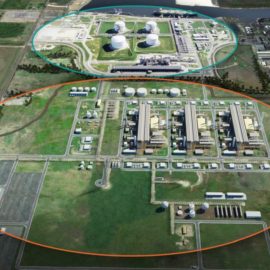
Lake Charles LNG wants more time and they are not getting it.
Though Lake Charles LNG lost its second attempt this quarter to gain more time for its liquefied natural gas export project, the firm plans to keep moving forward with the development — and the federal government gave them just enough wiggle room to do so. The Department of Energy on Wednesday denied Lake Charles LNG’s request to rehear its case for a three-year extension to begin exporting LNG to countries that don’t have free-trade agreements with the U.S. The federal agency — which oversees LNG export permits and sets deadlines by which shipments should begin — had already denied Lake Charles LNG’s initial petition in April. Despite the rejection, Lake Charles LNG officials said Friday they would push ahead with the project, which was likely headed for a final investment decision, or FID, by the end of the year, according to federal filings. In addition, the Department of Energy’s ruling said the firm could reapply for a new permit should it fail to export any LNG before the original authorization lapses in 2025. However, that could delay the project by years. Lake Charles LNG originally applied for its export permit in 2011 and didn’t obtain it until 2016.
nola.com
The Dallas company wanted until 2028.
Lake Charles LNG, owned by Dallas-based Energy Transfer LP, had asked the Department of Energy in June 2022 to give it until 2028 to begin exporting its product. The site is an LNG import facility that is being converted to an export terminal. The Federal Energy Regulatory Commission, which oversees construction of U.S. energy projects, had already granted a similar extension last year for the project’s build timeline. The Department of Energy had already granted Lake Charles LNG an extension in 2020. That decision gave the company until December 2025 to start exporting. However, in an April 21 order, the Department of Energy said Lake Charles LNG had not shown good cause for “an unprecedented second extension” beyond 2025. In its May 22 petition for a rehearing, Lake Charles LNG claimed it had already spent $350 million on “development costs” and had lined up 7.9 million tons worth of annual LNG exports via long-term contracts. It said its bid process for selecting an engineering, procurement and construction, or EPC, contractor had been upended by the COVID-19 pandemic, though it received new bids in May and hoped to select a contractor by July. “The foregoing examples illustrate just some of the significant progress that has unquestionably been made on the Liquefaction Project, all at a substantial investment of time and resources and despite the unprecedented consequences of the COVID-19 global pandemic,” the petition said.
The rehearing still said no.
However, in its rehearing denial this week, the Department of Energy argued the only new update Lake Charles LNG offered was its slate of long-term contracts. It accused Lake Charles LNG of “shifting facts” on its EPC contractor process, saying the company’s construction reports indicated it received bids as far back as 2015 but was still reviewing them for a “bid revalidation process.” It also said the company’s statements about the “difficult circumstances” it faced were vague, particularly when LNG demand boomed in 2022 as a result of the Russian invasion of Ukraine. The federal ruling said all operational U.S. LNG terminals reach a FID within six years of applying for their permit. Lake Charles LNG hasn’t reached that step 12 years after its initial application. “Given the length of time that (Lake Charles LNG) has previously spent in review and revalidation of EPC bids, well before the COVID-19 pandemic, and the observed pattern of milestones coming and going, DOE cannot assume that the more recent review of EPC bids will progress faster or now result in the selection of an EPC contractor,” the Department of Energy ruling said.
They gave the company enough daylight that they could move forward.
Despite the criticisms, the Department of Energy ruling gave Lake Charles LNG just enough daylight to pursue a new export permit years from now should its current permit expire before it ships any LNG. “In addition, should LCE be unable to commence exports by December 16, 2025, it is welcome to resubmit a non-(free trade agreement) request so that it can be evaluated under current policies with the most recent market information,” the ruling said. In a statement, Lake Charles LNG officials said they were disappointed by the decision but planned to continue the project’s development. “In light of the significant progress of Lake Charles LNG, we plan to continue to develop the project which may include the use of Lake Charles’ existing DOE export authorization,” the statement said. Lake Charles LNG was on a “strong path” for an FID by the end of 2023, according to the company’s May 22 rehearing request. However, that timeline hinged on the export deadline extension because lenders likely wouldn’t back the project amid timeline uncertainties. Company officials did not respond to a request for additional comment Friday on whether the FID timeline had changed following the Department of Energy’s ruling.
How many LNG terminals do we need?

